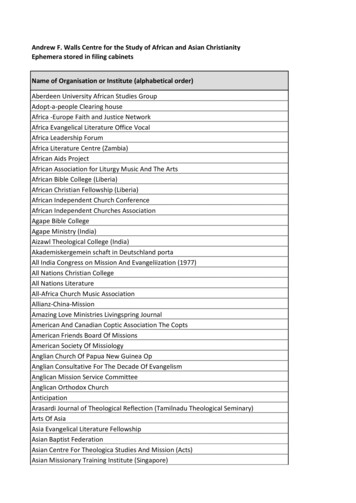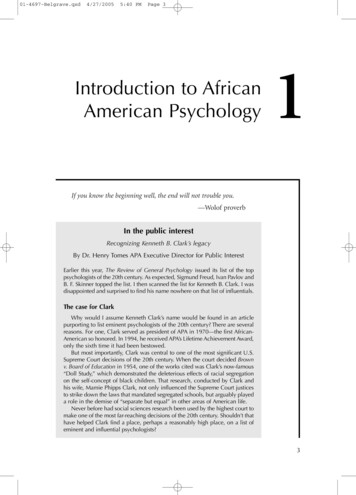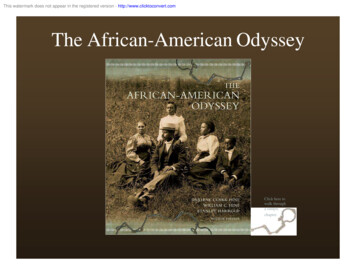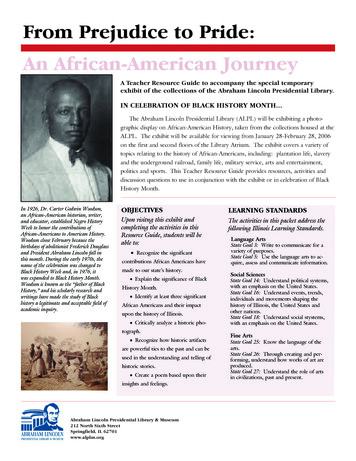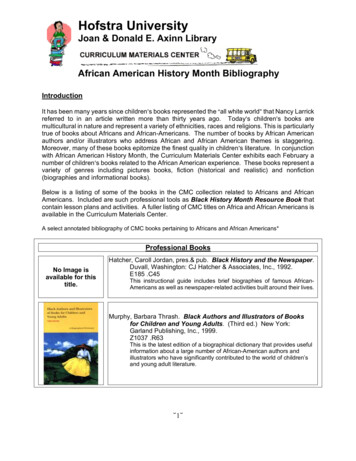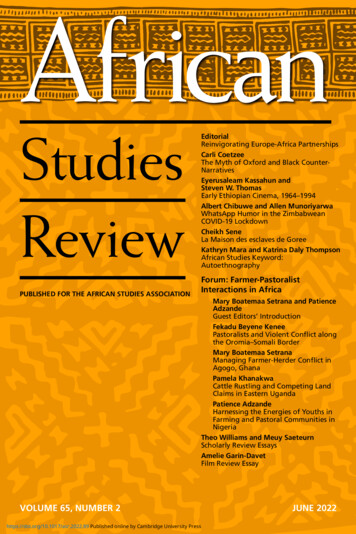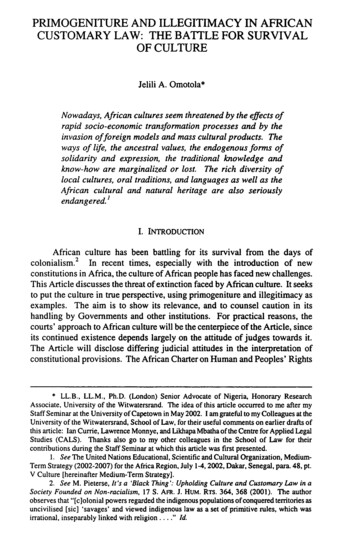
Transcription
PRIMOGENITURE AND ILLEGITIMACY IN AFRICANCUSTOMARY LAW: THE BATTLE FOR SURVIVALOF CULTUREJelili A. Omotola*Nowadays, African cultures seem threatenedby the effects ofrapid socio-economic transformation processes and by theinvasion offoreign models and mass culturalproducts. Theways of life, the ancestral values, the endogenous forms ofsolidarity and expression, the traditional knowledge andknow-how are marginalized or lost. The rich diversity oflocal cultures, oral traditions, and languages as well as theAfrican cultural and natural heritage are also seriouslyendangered.1I. INTRODUCTIONAfrican culture has been battling for its survival from the days ofcolonialism. 2 In recent times, especially with the introduction of newconstitutions in Africa, the culture of African people has faced new challenges.This Article discusses the threat of extinction faced by African culture. It seeksto put the culture in true perspective, using primogeniture and illegitimacy asexamples. The aim is to show its relevance, and to counsel caution in itshandling by Governments and other institutions. For practical reasons, thecourts' approach to African culture will be the centerpiece of the Article, sinceits continued existence depends largely on the attitude of judges towards it.The Article will disclose differing judicial attitudes in the interpretation ofconstitutional provisions. The African Charter on Human and Peoples' Rights* LL.B., LL.M., Ph.D. (London) Senior Advocate of Nigeria, Honorary ResearchAssociate, University of the Witwatersrand. The idea of this article occurred to me after myStaff Seminar at the University of Capetown in May 2002. I am grateful to my Colleagues at theUniversity of the Witwatersrand, School of Law, for their useful comments on earlier drafts ofthis article: Ian Currie, Lawrence Monnye, and Likhapa Mbatha of the Centre for Applied LegalStudies (CALS). Thanks also go to my other colleagues in the School of Law for theircontributions during the Staff Seminar at which this article was first presented.1. See The United Nations Educational, Scientific and Cultural Organization, MediumTerm Strategy (2002-2007) for the Africa Region, July 1-4, 2002, Dakar, Senegal, para. 48, pt.V Culture [hereinafter Medium-Term Strategy].2. See M. Pieterse, It's a 'Black Thing': Upholding Culture and Customary Law in aSociety Founded on Non-racialism, 17 S. AFR. J. HUM. RTs. 364, 368 (2001). The authorobserves that "[clolonial powers regarded the indigenous populations of conquered territories asuncivilised [sic] 'savages' and viewed indigenous law as a set of primitive rules, which wasirrational, inseparably linked with religion . Id.
IND. INT'L & COMP.L. REV.[Vol. 15:1is brought into focus. It will be stressed that when interpreting the Charter, allof its provisions must be taken together so as to give full effect to it. The articleis divided into two sections. Section A discusses the primogeniture rule, whilethe discussion of illegitimacy follows in Section B. The Article concludes bymaking recommendations, which hopefully, will ensure the survival of Africanculture.II. THE PRIMOGENITURE RULEPrimogeniture has been in existence in Africa since the early times. Itpermits only male issues to inherit the property of a person who dies intestate.The rule has been criticized on the ground that it prohibits female children frominheriting.34The discussion will start with the celebrated case of Mthembu v. Letseladecided in South Africa. Here, the intestate had been in an apparent customaryrelationship with the Appellant. The deceased, his parents, the Appellant andher two daughters lived together on a ninety-nine year lease property registeredin his name. His only child, Tembi, was one of the Appellant's daughters. Thefirst Respondent, the father of an intestate, claimed title to the house andinstituted proceedings for eviction against the Appellant and her daughter. TheMagistrate, who had earlier made an order for the deceased's estate to devolveaccording to customary law, was the second Respondent.The Appellant alleged that there was a customary marriage between herand the deceased. In support of this allegation, she attached to her affidavit acopy of an acknowledgment of receipt of the first installment of R 900 towardsher lobola of 2000.00. The balance was to be paid soon thereafter. Thedeceased, however, died before it could be paid. The Appellant challenged thevalidity of the customary law rule preventing Tembi from inheriting due to hergender. She also claimed that she and her daughter could not be evicted fromthe property.The matter first came before Justice Le Roux in the High Court. Thelearned judge was unable to resolve the factual dispute relating to the existenceof a customary marriage between the parties. He referred that issue for oralevidence and adjourned the matter indefinitely. With regard to theconstitutionality of the customary law rule of primogeniture, he said:3. See V. Bronstein, Reconceptualizing the Customary Law Debate in South Africa, 14S. AFR. J. HuM. RTs. 388 (1998); K. L. Robinson, The Minority and Subordinate Status ofAfrican Women Under Customary Law, 1 S. AFR. J. HUM. RTS. 457 (1995). See generally T.W. BENNEir, HUMAN RIGHTS AND AFRICAN CUSTOMARY LAW UNDER THE SOUTH AFRICANCONSTITUTION 86 (1995); W. V. Meide, Gender Equality v. Right to Culture: Debunking thePerceived Conflicts Preventing the Reform of the Marital Property Regime of the 'OfficialVersion' of Customary Law, 116 S. AFR. L.J. 100 (1999).4. 2000 (3) SA 867 (CC).
2004]PRIMOGENITURE AND ILLEGITIMACY IN AFRICAN CUSTOMARY LAW117If one accepts the duty to provide sustenance, maintenanceand shelter as a necessary corollary of the system ofprimogeniture (a feature which has been called 'one of themost hallowed principles of customary law'), I find it difficultto equate this form of differentiation between men and womenwith the concept of 'unfair discrimination' as used in Section8 of the Constitution . I cannot accept the submission thatthe succession rule is necessarily in conflict with Section 8. Itfollows that even if this rule is primafacie discriminatory ongrounds of sex or gender and the presumption contained inSection 8(4) comes into operation this presumption has beenrefuted by the concomitant duty of support.5When the matter later came before Judge Mynhardt at the second HighCourt trial, the learned judge remarked:The applicable African customary law of succession in thepresent case is to the effect that Tembi cannot be regarded asthe deceased's heir and that the first respondent is his heir.This is so because of the principle, or system, ofprimogeniture, which is applied in African customary law .If I were to accede to Mr[.] Trengove' s request and declare thecustomary law rule of succession invalid because it offendsagainst public policy, I would, I believe, be applying Westernnorms to a rule of customary law, which is still adhered to andapplied by many African people.6He held that there was no marriage between the parties. Thus, it wasunnecessary to discuss the constitutionality of the rule, because Tembi wasillegitimate and would not be eligible to inherit even if she were a male. Thisdecision will be analyzed further under Section B, when the discussion turns toillegitimacy.On appeal to the Supreme Court of Appeal, Judge Mpati , delivering thejudgment of the Court, said:The customary law of succession in Southern Africa is basedon the principle of male primogeniture. In monogamousfamilies the eldest son of the family head is his heir, failinghim the eldest son's eldest male descendant. Where the eldestson has predeceased the family head without leaving maleissue the second son becomes heir; if he be [sic] dead leavingno male issue the third son succeeds and so on through the5. Mthembu v. Letsela, 1997 (2) SA 936, 945 (citing BENNETt, supra note 3, at 400).6. Mthembu v. Letsela, 1992 (2) SA 675, 679.
IND. INT'L & COMP.L. REv.[Vol. 15:1sons of the family head. Where the family head dies leavingno male issue his father succeeds. It follows that in terms ofthis system of succession, whether or not Tembi is thedeceased's legitimate child, being female, she does not qualifyas heir to the deceased's estate. Women generally do notinherit in customary law. When the head of the family dies hisheir takes his position as head of the family and becomesowner of all the deceased's property, movable and immovable;he becomes liable for the debts of the deceased and assumesthe deceased's position as guardian of the women and minorsons in the family. He is obliged to support and maintainthem, if necessary from his own resources, and not to expelthem from his home.7The Court held, however, that the Constitution could not apply since it did nothave retroactive effect.In the recent case of Nonkululeko Bhe v. Khayelisha,8 the third Applicantand the deceased lived together as husband and wife for a period of twelveyears. Two minor children were born of the relationship. They are the first andsecond Applicants in the case. The deceased acquired an immovable propertyduring his lifetime and lived there with the three Applicants until the time of hisdeath. After his death the three Applicants continued to live on the property.The second Respondent claimed that he was the intestate's heir by virtue ofAfrican customary law and, therefore, entitled to inherit his property. He alsoindicated that he intended to sell the property to defray the funeral expensesincurred as a result of the deceased's death. Judge Ngwenya noted that theattitude of the courts towards African customary law has been a cause forconcern. He referred to the case of Du Plessis v. De Klerk9 in which JudgeMokgoro said that "customary law [has been] lamentably marginalised, andallowed to degenerate into a vitrified set of norms alienated from its roots in thecommunity."' 0 In spite of these remarks, Judge Ngwenya proceeded to declare:We should make it clear in this judgment that a situationwhereby a male person will be preferred to a female person forpurposes of inheritance can no longer withstand constitutionalscrutiny. That constitutes discrimination before the law. Toput it plainly, African females, irrespective of age or socialstatus, are entitled to inherit from their parents' intestate likeany male person. This does not mean that there may not be7. Mthembu, (3) SA at 876.8. No. 9489/2002 (C.H.C. Sept. 25, 2003) (unreported judgment of the Cape High Courtdelivered by Ngwenya, J. (on file with author).9. 1996 (3) SA 850 (CC).10. Id.
2004]PRIMOGENITURE AND ILLEGITIMACY IN AFRICAN CUSTOMARY LAW119instances where differentiation on gender line may not bejustified for purposes of certain rituals. As long as this doesnot amount to disinherison or prejudice to any femaledescendant. On the facts before us, therefore, the first twoapplicants are decided to be the sole heirs to the deceased'sestate and they are entitled to inherit equally."This decision amounts to overturning the customary law rule of primogeniturewithout any regard to its implications.The case of Mthembu v. Letsela was referred to by counsel for theRespondents but was not discussed because the Constitution was not applicableto it. There were, of course, important issues relating to the primogeniture rulewhich were discussed by the courts in Mthembu, which were not considered bythe learned judge in this case. Two considerations might have influenced hisdecision. First, the Respondent planned to sell the house to meet funeralexpenses. Although this is outrageous, it is not a sufficient reason for declaringinvalid the custom of the people, which is seen as the keystone of their culture.The best the court could have done was to make an order preventing the sale of12the property and thereby "not throw out the baby with the bath water.'Second, Counsel for the Applicants was smart enough to bring sentiment tobecloud the decision of the learned judge by making it appear as if theprimogeniture rule was introduced by the Black Administration Act and againstthe Blacks. Counsel argued and the Judge agreed that "the only reason why thefirst two applicants are not entitled to inherit from their father's estate abinterstatioin these proceedings is threefold. Firstly,3 they are black, secondlythey are females, and thirdly they are illegitimate."'1In truth, the Act does not introduce the rule, but recognizes it as part ofAfrican culture. This point was stressed in Mthembu by Judge Mpati whendealing with the regulations promulgated under the Act. The learned judgesaid:What needs to be stressed from the outset is that the regulationin issue did not introduce something foreign to Black persons,as was the case in Machika en Andere v. StaatspresidentenAndere. It merely gave legislative recognition to a principle orsystem which had been in existence and followed, at least, fordecades.1411. Nonkululeko Bhe, No. 9489/2002.12. See Masango v. Masango S 66-86 (unreported judgment of the Supreme Court ofZimbabwe) (on file with author); see also Matambo v. Matambo, 1969 (3) SA 717 (RA).13. See Nonkululeko Bhe, No. 9489/2002.14. Mthembu, 2000 (3) SA at 880; see also Machika en Andere v. Staatspresident enAndere, 1989 (4) SA 19 (T).
IND. INT'L & COMP. L. REV.[Vol. 15:1If Judge Ngwenya had examined the rule more carefully, and hadconsidered the views expressed on it by other judges, he probably would havefollowed the path of caution. The primogeniture rule in customary law issimilar to the common law rule under which all the realty (immovableproperties) vested in the intestate passed to his heir, the eldest male child,subject to the rights of the surviving spouse. Some chattels (movableproperties) known as heirloom also descended to the heir. At common law theheir takes beneficially, but in customary law he takes on behalf of the family.The court did not tamper with the common law rule, but required Parliament tointervene in 1925 when it deemed fit to do so after full investigation andconsultation.' 5In Mthembu v. Letsela, Judge Mynardt declined an invitation by counselto develop the Customary Law rule. He said:In the present case I therefore decline the invitation to developthe customary law of succession which excludes women fromparticipating in intestacy and which also excludes childrenwho are not the eldest male child. In any event, because thedevelopment of that rule, . . . would affect not only thecustomary law of succession but also the customary family lawrules, I think that such development should rather beundertaken by Parliament and in this regard I can do no betterthan to repeat, in regard to customary law, what was said by[Judge] Kentridge . in . the Du Plessis case, . . in regardto the common law, namely[:] 'The radical amelioration of thecommon law has hitherto been a function of Parliament; thereis no reason to believe6 that Parliament will not continue toexercise that function.1Judge Mpati with the Supreme Court of Appeal, also declined to developthe rule, preferring to leave it to the South African Law Commission, who arein a better position to make proper recommendations to Parliament. Thelearned judge said:[Counsel] contended that the rule is based on 'inequality,arbitrariness, intolerance and inequity', all of which arerepugnant to the new constitutional order. He urged us todevelop the rule . so as to allow all descendants, whethermale or female, legitimate or illegitimate, to participate inintestacy . we would be ill-equipped to develop the rule forlack of relevant information. Any development of the rule15. See R. E. MEGARRY & H. W. R. WADE, THE LAW OF REAL PROPERTY 539-48 (5th ed.1984).16. Mthembu, 1998 (2) SA at 686-87.
2004]PRIMOGENITURE AND ILLEGITIMACY IN AFRICAN CUSTOMARY LAW121would be better left to the legislature after a process of fullinvestigation and consultation, such as is currently being17undertaken by the Law Commission.In the case of Magaya v. Magaya,18 discussed later, Judge Muchechetereinsisted that the function of reform of the rule is that of the legislature, and notthe court. In this regard he observed:Matters of reform should be left to the legislature .In thecase of succession a court could not simply rule customarynorms void; it would have to stipulate how much widowscould inherit and in what circumstances. Details of this naturecannot be determined in judicial proceedings. The propermedium for reform would be legislation, which permits fullinvestigation of the social context and consultation withinterested groups.' 9Section 6 of the South African Promotion of Equality and Prevention ofUnfair Discrimination Act2 provides that "neither the State nor any person mayunfairly discriminate against any person." Section 8 of the Act also providesthat, "subject to Section 6, no person may unfairly discriminate against anyperson on the ground of gender, including the system of preventing womenfrom inheriting family property.' ' 21 These new statutory provisions came intoeffect after Mthembu.The question, therefore, is whether these provisions will have the effect ofinvalidating the primogeniture rule. To answer that question, one must askwhether the new provisions are covered by the 1996 Constitution. Incomparing the Constitution and the Act, the only difference is the specificreference in the Act to discrimination, which prevents women from inheritingfamily property. Therefore, the question is whether those provisions of the Actadd anything to what the Constitution already covers in Section 9. Subsection 4of Section 9 provides that "no person may unfairly discriminate directly orof subsection (3).,,22indirectly against anyone on one or more grounds in termsThe grounds listed in the latter subsection are "race, gender, sex, pregnancy,marital status, ethnic or social origin, color, sexual orientation, age, disability,23religion, conscience, belief, culture, language and birth." Discrimination onground of sex is included in this provision. Therefore, the Act did not add17. Mthembu, 2000 (3) SA at 881, 883.18. 1999 (1) ZLR 100 (S).19. Id. at 114.20. South African Promotion of Equality and Prevention of Unfair Discrimination Act 4of 2000 (S. Afr.).21. Id. § 8, para. (c).22. Id. § 6.23. S.AFR. CONST. § 9(4).
IND. INT'L & COMP.L. REV.[Vol. 15:1materially to the existing provisions in Section 9 of the Constitution. Under theConstitution and the new Act, discrimination must be shown to be fair. Section9(5)24 of the 1996 Constitution, like Section 8(4)25 of the 1993 Constitution, putthe burden of proof of the fairness of the discrimination on the person whowants to take advantage of the discrimination. The 1993 Constitution requiresprima facie proof of discrimination, which is presumed to be sufficient proofthereof. Under the 1996 Constitution, discrimination is unfair unless it isestablished that the discrimination is fair. Both the Constitution and the Act areconcerned with unfair discrimination and not discrimination per se.In the Nigerian case of Mojekwu v. Mojekwu, 26 a well-known case in thatcountry, the Appellant claimed that the deceased, the owner of the property,was his father's only brother who predeceased his father. The deceased hadtwo wives, the Respondent, Caroline, and another wife, Janet. Caroline had ason who died in 1970, and had no issue. Janet had two daughters. Thedeceased bought the property in dispute from the Mgbelekeke family of Onishaunder Kola tenancy. 27 The Appellant claimed that he inherited the propertyunder the native law and custom of Nnewi, which is their home, because hewas the eldest surviving son of his father and the eldest male in the Mojekwufamily. He paid the necessary kola, as consideration to the Mgbelekeke family,who recognized him as a kola tenant. Respondent denied Appellant's claim.Under the Mgbelekeke family customary law of Onitsha,both male and femalechildren can inherit the property of an intestate. The customary law of Nnewi isknown as Oli-ekpe,28 and under it only males can inherit. The trial judgedecided that the applicable law is the lex situs, that is, the law where the land issituated. In this case, the customary law was therefore that of the Mgbelekekefamily of Onitsha, and not the Oli-ekpe.The Nigerian Court of Appeal agreed with the trial judge that theapplicable law is the lex situs, which is the Mgbelekeke family customary law.Justice Niki Tobi, delivering the judgment of the court, expressed the followingview on the Oli-ekpe custom:24. Id. § 9(5). This section provides that "[d]iscrimination on one or more ground listedin subsection (3) is unfair unless it is established that the discrimination is fair." Id.25. Id. § 8(4). This section provides that "prima facie proof of discrimination on any ofthe grounds specified in subsection (2) shall be presumed to be sufficient proof of unfairdiscrimination as contemplated in that subsection, until the contrary is established." Id.26. 1997 (7) N.W.L.R. 283 (Nig.).27. Id. at 301. Section 2 of the Kola Tenancy Law of 1935 (of then Eastern Region ofNigeria) defines a Kola tenancy as a right of use and occupation of any land, which is enjoyedby any native in virtue of a Kola or other token payment made by such native or any predecessorin title or in virtue of a grant for which no payment in money or in kind was enacted. Thesignificant legal incident of a Kola tenancy is that the tenant has a limited right of disposal. TheKola tenant enjoys all the rights of an absolute owner but not the right of absolute disposition.Id.28. Oli-ekpe is sometimes referred to as lli-kpe.
2004]PRIMOGENITURE AND ILLEGITIMACY IN AFRICAN CUSTOMARY LAW123The appellant claims to be that "Oli-ekpe". Is such a customconsistent with equity and fairplay in an egalitarian societysuch as ours where the civilized sociology does notdiscriminate against women? Day after day, month aftermonth and year after year, we hear of and read about customs,which discriminate against the womenfolk in this country.They are regarded as inferior to the menfolk. Why should itbe so? All human beings, male and female are born into a freeworld and are expected to participate freely, without anyinhibition on grounds of sex; and that is constitutional. Anyform of societal discrimination on grounds of sex, apart frombeing unconstitutional is antithesis to a society built on thetenets of democracy, which we have freely chosen as a people.We need not travel all the way to Beijing to know that some ofour customs, including the Nnewi Oli ekpe custom relied uponby the appellant are not consistent with our civilized world inwhich we all live today, including the appellant. In myhumble view, it is the monopoly of God to determine the sexof a baby and not the parents. Although the scientific worlddisagrees with this divine truth, I believe that God, the Creatorof Human being, is also the final authority of who should bemale and female. Accordingly, for a custom or customary lawto discriminate against a particular sex is to say the least anaffront on the Almighty God himself. Let nobody do such athing. On my part, I have no difficulty in holding that the Oliekpe custom of Nnewi is repugnant to natural justice, equityand good conscience.29Oli-ekpe custom should not be seen as contrary to natural justice, equity,and good conscience. Female children are not prevented from benefiting. Thefamily property that the heir inherits is to be used for the benefit of all familymembers who will fall under his care. It does not belong to him in his personalcapacity. What is inequitable in asking property to be held for others or insaying males should hold for females, so long as no one that is entitled isthereby deprived?This is the principle upon which the English Trust was founded in orderto keep the property safe and ensure evenhandedness in its administration.Under English law, property could be held in trust by one person known astrustee, on behalf of others who are called beneficiaries. Sometimes, the trusteealso has beneficial interest in the property, and will, in the circumstance, havedual capacity. 30 The learned justice referred to the custom as unconstitutional29. Mojekwu, 1997 (7) N.W.L.R. at 304-05.30. See G. W. KEETON & L. A. SHERIDAN, THE LAW OF TRUSTS 2-6 (12th ed. 1993)(discussing the definition of trusts); see also Jacobs, Law of Trusts in Australia in R. P.
IND. INT'L & COMP. L. REv.[Vol. 15:1and antithetical to a society based on the tenets of democracy. He said, "anyform of societal discrimination on grounds of sex, apart from beingunconstitutional is antithesis to a society built on the tenets of democracy,which we have freely chosen as a people.",3' Since his judgment was deliveredin 1997, the only Constitution that could apply in Nigeria was the FederalRepublic of Nigeria Constitution of 1979. Most of its provisions weresuspended, abrogated, or modified by the Military in 1984, by its Decree No. 1of 1984. Although fundamental rights relating to discrimination, contained inSection 39, Chapter IV of the Constitution, were preserved, it is doubtfulwhether this provision would justify the dismissal of the primogeniture rule,especially considering the provisions of Section 20 of the same Constitution,which provide for the protection of Nigerian culture.In Magaya v. Magaya,32 another celebrated case decided by the SupremeCourt of Zimbabwe, the deceased had two wives by customary law marriage.Appellant, a female, was the only child by the first wife, and the Respondentwas one of the three sons by the second wife. Appellant was the eldest child ofthe deceased. Respondent's brother was the eldest of the three sons andeligible to succeed the deceased, but declined to take up heirship. He said thathe would be unable to look after the family. The Community Court appointedAppellant as the heiress to the estate, without notifying the Respondent andother interested parties. The court later cancelled the appointment of Appellantupon application by Respondent challenging the appointment. The presidingmagistrate awarded the heirship to Respondent because the customary law ruleof intestate succession favored males over females. The court relied on section68 (1) of the Zimbabwe Administration of Estates Act, 33 which provided that ifan African married according to customary law or custom dies intestate, hisestate must be administered and distributed according to the customs andusages of the tribe or people to which he belonged.On appeal to the Supreme Court of Zimbabwe, the Court held that,although the rule constitutes a prima facie discrimination against females, andtherefore could be a prima facie breach of the Constitution of Zimbabwe, whichby section 23(1) and (2) forbid discrimination on grounds of race, tribe, placeof origin, political opinion, color or creed, the exemption in Section 23(3)excludes application of this provision in matters relating to succession and theapplication of African customary law. Based on these grounds, the courtdismissed the appeal. Judge Muchechetere, delivered the lead judgment andrationalized the rule thus:In my understanding of African society, especially that of apatrilineal nature, the perpetual discrimination against womenstems from the fact that women were always regarded asMEAGHER & W. M. C.GuMow,JACOBS' LAW OF TRUSTS IN AUSTRALIA 1-6 (4th ed. 1977).31. Mojekwu, 1997 (7) N.W.L.R. at 304.32. 1999 (1) ZLR 100 (S).33. Zimbabwe Administrations of Estates Act, ch. 68(1) (Nig.).
2004]PRIMOGENITURE AND ILLEGrrIMACY IN AFRICAN CUSTOMARY LAW125persons who would eventually leave their original family onmarriage, after the payment of roorallobola,to join the familyof their husbands. It was reasoned that in their newsituation-a member of the husband's family-they could notbe heads of their original families, as they were more likely tosubordinate the interests of the original family to those of thenew family. It was therefore reasoned that in their newsituation they would not be able to look after the originalfamily. It was also reasoned that the appointment of femaleheirs would be tantamount to diverting the property of theoriginal family to that of the new family. This would mostlikely occur on the death of a female heir. Then her propertywould be inherited by her children who would be members ofher new family. This in my view would be a distortion of theprinciples underlying customary law of succession andinheritance.34Muchcchetere stressed the obligations of the heir towards the family, asdid Le Roux, and Mpati, in Mthembu. He also acknowledged the responsibilityof the heir under customary law to maintain and support the family of thedeceased and referred to two cases in support: Masango v. Masango35 andMatambo v. Matambo36 . Indeed, in Masango, the judge refused to grant anorder to evict the heir's late father's wife and children because the heir did notprovide alternative accommodation for them. Assuming, therefore, that theduty of support is central to the primogeniture rule, how may it be enforced? Isit enough to refuse eviction as in Masango or can the court do more, so as todisentitle an heir who abandons his responsibilities to the family?In Matombo v. Matombo, the court approved a departure where the mostsenior male was bypassed, and the bulk of the property of the deceased wasgiven to a junior male, on the ground that if all the property was given to thenot deal with it to the bestmost senior for the rest of the family, he might37advantage of all other members of the family.The ground upon which the rule was saved in Mthembu, namely theconcomitant duty of support, must be enforced by the courts in such a way thatit does not impose empty obligations on the heirs. Members of the family ofthe deceased must have locus standi to compel the successor to fulfill hiscustomary law duties. Failure to fulfill this duty should be made a civil wrong.In its discussion paper on customary law, the South African
families the eldest son of the family head is his heir, failing him the eldest son's eldest male descendant. Where the eldest son has predeceased the family head without leaving male issue the second son becomes heir; if he be [sic] dead leaving no male issue the third son succeeds and so on through the 5. Mthembu v.
